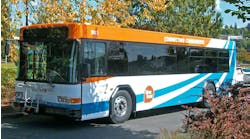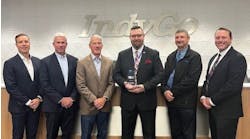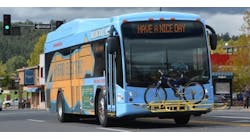NFI Parts® has published the results of its proactive air and surface purification (PASP) system test on an in-service bus at the city and county on Honolulu, which showed positive impact on air and surface cleanliness.
Independent testing results performed by EMSL Analytical, Inc., showed overall bacteria count reductions of 99.3%1, demonstrating the PASP system ability to deactivate the SARS-CoV-2 virus, which causes COVID-19.
With PASP technology onboard, public and private sector customers have the potential to better protect transit operators and riders through the reduced occurrence of bacteria, and the ability to create cleaner air and surfaces within the operating environment.
The test with the City and County of Honolulu analyzed surface bacteria counts on a 60-foot, 3-door mass transportation bus over the course of six days, included:
- Contamination levels tested on Days one, three, and five with no added disinfecting procedures added to regular cleaning methods.
- Contamination levels tested on Days two, four, and six after a full day of operating in service with one PASP unit activated.
The bus operated the exact same 12-hour route over the course of six consecutive testing days. The route is an established part of the City and County of Honolulu’s service map and was operated during normal service hours, and with vehicle doors opened and closed at all regular stops, allowing riders to enter and exit freely.
Over the course of six days, surface contamination was measured by collecting and comparing bacteria on four surface locations before and after running PASP technology. Swabs were taken daily at the same four locations after returning from revenue service, and before a standard cleaning of the bus each night, and were then sent to EMSL Analytical, Inc. for evaluation.
“We are thrilled demonstrate proven impact and measurable capabilities of our PASP system in a realworld scenario, and appreciate the City and County of Honolulu working with us to make that happen,” said Kerri Moloney, Vice President of Customer Service, NFI Parts. “This test further illustrates how PASP technology can improve the health of a transit environment through drastic reduction of air and surface bacteria. The PASP system undeniably contributes to the health and safety of passengers, operators, maintenance and cleaning teams.”
NFI Parts, along with NFI subsidiaries New Flyer, MCI, ARBOC and Alexander Dennis, have been actively working with industry committees in the United States and Canada to develop practices and equipment to safeguard operators and passengers, and launched an entire family of NFI Parts Clean and Protect products. The PASP system continues to demonstrate those working in and taking transit that onboard environments can meet their expectations of safety and cleanliness with the integration of proven technologies.
“The PASP unit allows transit authorities to resume regular cleaning methods while relying on our technology,” continued Moloney. “The transit industry has made significant investments in deepcleaning and disinfecting products over the past year to ensure safety on public transit; adding significant complexity and expense. Our technology can take care of overall air and surface purification during service hours, without pulling buses from service for cleaning.”
The PASP system uses proprietary technology to create advanced purification by producing High Energy Clusters which are distributed throughout the interior of the vehicle, safely sanitizing both air and surfaces, and leaving behind virtually no harmful residue. It is mounted directly in the passenger compartment for direct exposure to where viruses may circulate. The unit is easy to install and maintain; only requiring 12V power to operate and not voiding any vehicle system warranties.
“These results are very encouraging,” said Jenny Lemaota, Acting President and General Manager at Oahu Transit Services. “We have worked very hard throughout the pandemic to ensure the safety of our drivers and riders. Seeing real-world results of new technologies is a great asset when it comes to choosing what we need to equip our fleet.”


